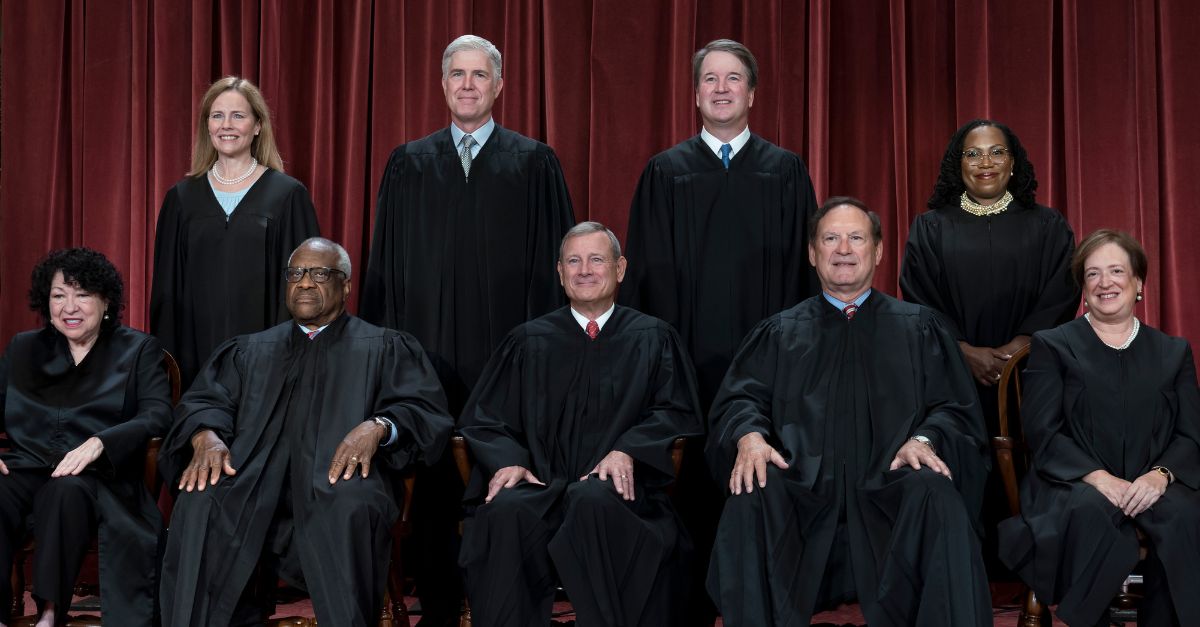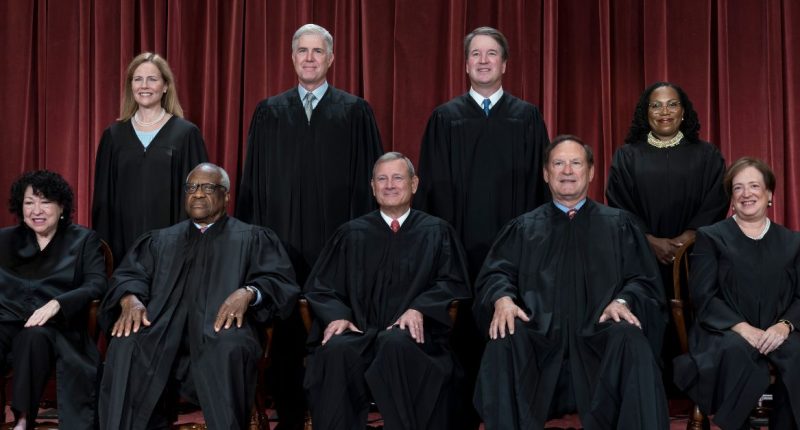
Members of the Supreme Court sit for a new group portrait following the addition of Associate Justice Ketanji Brown Jackson, at the Supreme Court building in Washington, Friday, Oct. 7, 2022. Bottom row, from left, Associate Justice Sonia Sotomayor, Associate Justice Clarence Thomas, Chief Justice of the United States John Roberts, Associate Justice Samuel Alito, and Associate Justice Elena Kagan. Top row, from left, Associate Justice Amy Coney Barrett, Associate Justice Neil Gorsuch, Associate Justice Brett Kavanaugh, and Associate Justice Ketanji Brown Jackson. (AP Photo/J. Scott Applewhite)
A Mexican family facing imminent deportation is asking the U.S. Supreme Court to take up its case, with family members asserting that they are facing removal from the U.S. despite having provided authorities with “credible and detailed evidence” that they “have been explicitly threatened with death by cartel members.”
Fabian Lagunas-Espinoza and his family, who entered the country in September 2021, claim their case raises constitutional and statutory questions that involve issues of due process, “misapplication of asylum law,” and “improper factual determinations.” According to the 10-page petition submitted to the justices on Wednesday, armed members of the Los Rojos cartel in August 2021 “threatened the family at gunpoint, demanding they vacate their home within 24 hours or be killed.”
“They complied, fled their town, and entered the United States shortly thereafter,” the filing states. “Previously, Petitioner’s brother had been beaten after refusing cartel demands, and another brother was targeted and forced to flee after receiving death threats, following witnessing criminal activity.”
Despite an immigration judge finding the family members’ testimony to be credible, they were denied relief. That decision was upheld by the Board of Immigration Appeals (BIA), even though the family members had “strong documentary evidence” showing that they would be in imminent danger if they returned to Mexico.
The family alleges that the BIA engaged in “improper factfinding” that violated the Convention Against Torture as well as Supreme Court precedent. According to the filing, the BIA allegedly inquired as to the likelihood that the family would be subjected to torture whereas the initial immigration judge who denied relief “made no specific findings” on the matter other than “merely reciting the standards and saying Petitioner had not met their burden.”
A lack of adequate fact-finding at the initial stage of the asylum process automatically requires the BIA to remand the case back to the immigration judge, per the petition.
“The BIA declined to remand, asserting lack of evidence regarding countrywide risk, despite the record showing ongoing cartel violence directed at this family, direct threats, expansion of the cartel to all parts of the country, prior physical assaults by cartel actors against family, as well as a pattern of cartels targeting family members of those with whom they have a grievance,” the filing says. “This kind of unsupported legal conclusion fails to satisfy the requirement that CAT claims be adjudicated with reasoned fact finding.”
Before fleeing Mexico, the family claimed that several relatives had been kidnapped and beaten — with one nearly dying from their injuries after refusing “cartel extortion demands.”
Lagunas-Espinoza further contends that the immigration judge mischaracterized evidence that the family was being targeted by the cartel, saying it was just “generalized criminal activity” that had “no nexus” to any grounds for protection.
“The [immigration judge] ignored or minimized the pattern of specific threats and past harm against family members, and did not analyze whether family association itself was a central reason for the harm,” petitioners wrote. “By rejecting all proposed [particular social groups] and concluding that the harm stemmed from criminal extortion alone, the [immigration judge] foreclosed legitimate grounds of relief without a reasoned nexus analysis.”
The BIA similarly found “no nexus” to a protected ground and “no likelihood of torture” for the family
The family also filed an appeal with the U.S. Court of Appeals for the 9th Circuit for an en banc hearing to halt its return, which they say can happen at any moment.
Love true crime? Sign up for our newsletter, The Law&Crime Docket, to get the latest real-life crime stories delivered right to your inbox.







